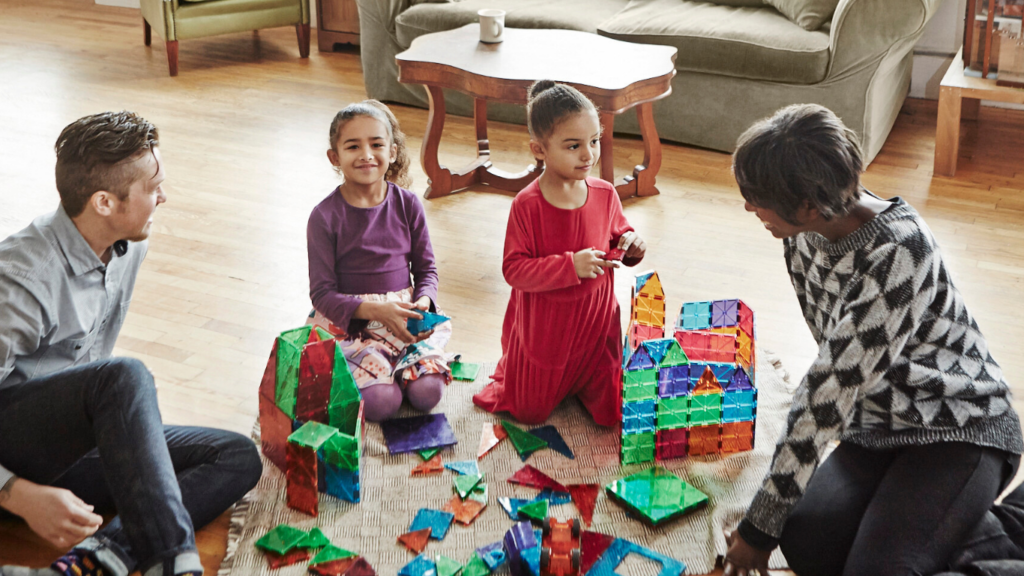When I think about the happiest moments with my family, they almost always involve laughter, shared experiences, and a sense of togetherness. Play isn’t just for kids—it’s a powerful way to connect, build trust, and create lasting memories. Whether it’s a spontaneous game night or a weekend hike, these moments of joy strengthen the bonds that hold families together.
In today’s fast-paced world, it’s easy to let work, school, and screens take over. But carving out time for family activities isn’t just fun; it’s essential. Play nurtures communication, fosters teamwork, and reminds us of the simple joy of being present with one another. It’s in these shared experiences that relationships grow stronger, creating a foundation of love and support that lasts a lifetime.
The Importance Of Play In Family Dynamics
- Play serves as a cornerstone in creating and maintaining healthy family relationships. It encourages natural bonding by allowing family members to interact in relaxed, enjoyable settings. Activities like board games, sports, or storytelling offer opportunities to build trust and deepen connections.
- Shared play enhances communication within families. Open dialogue often thrives in playful environments because individuals feel at ease expressing themselves. Group activities, such as puzzles or team-oriented games, promote problem-solving and active listening.
- Engaging in play positively impacts emotional well-being. Laughter and shared joy during playful moments release tension, reduce stress, and foster a sense of belonging. For example, a simple game of tag or a casual cooking contest can help diffuse conflicts and create harmony.
- Play also strengthens intergenerational connections. Grandparents, parents, and kids participating together bridge age gaps and foster mutual understanding. Traditional childhood games or creative DIY projects can reinforce family values while celebrating shared heritage.
- Integrating play into daily routines ensures consistent opportunities for relationship-building. Whether through a scheduled weekly game night or spontaneous moments like a backyard soccer match, regular engagement solidifies emotional bonds.
Benefits Of Family Activities
Family activities bring people together, creating meaningful connections that strengthen their relationships. Each shared experience contributes to emotional growth and mutual understanding.
Strengthening Emotional Bonds
Shared family activities build trust and provide opportunities to connect on a deeper level. Playful interactions, such as playing soccer or baking together, create positive memories linked to feelings of joy and security. These moments help family members feel valued, enhancing emotional closeness. Engaging in consistent activities fosters a sense of belonging, which reduces feelings of isolation.
Promoting Communication
Participating in planned or spontaneous family activities improves how people communicate. For example, discussing strategies during board games or expressing creativity during art projects encourages open dialogue. These activities provide safe spaces for honest conversations, making it easier for individuals to listen, share, and understand each other without judgment. Improved communication helps minimize conflicts while promoting empathy.
Encouraging Teamwork And Cooperation
Family activities like solving puzzles or participating in team sports nurture teamwork skills. Collaborative efforts require families to set goals, delegate roles, and rely on each other’s strengths. This builds mutual respect and teaches the importance of collective success. Activities promoting cooperation also allow members to:
- practice patience
- understanding
- resilience
reinforcing positive dynamics within the group.
Types Of Family Activities To Strengthen Relationships

Engaging in diverse family activities helps create deeper emotional bonds and facilitates meaningful communication. By choosing activities suited to different settings, families can maximize the time spent together.
Indoor Activities For Quality Time
Indoor activities offer families opportunities to connect in a comfortable and familiar environment. Cooking meals together allows every member to participate, collaborate on recipes, and share laughs during preparation. Game nights with board games like Monopoly or cooperative card games encourage teamwork and strategy-building while delivering moments of joy. Storytelling sessions help spark conversations, strengthen familial ties, and foster creativity, especially when including younger children. Families can also bond over movie nights, combining entertainment with shared emotional experiences.
Outdoor Adventures For Connection
Outdoor activities provide a refreshing setting for family engagement and physical activity. Hiking promotes teamwork as family members navigate trails and appreciate nature together. Picnics in local parks combine relaxation with shared meals, making them ideal for connecting away from screens. Playing sports like soccer or basketball fosters collaboration, teaches skills, and strengthens interpersonal relationships. Families can also explore new areas by visiting zoos, botanical gardens, or cultural landmarks, creating lasting memories through new shared experiences.
Games And Creative Projects
Games and creative projects encourage innovative thinking, collaboration, and problem-solving. Puzzle-solving involves teamwork and communication, offering a rewarding sense of accomplishment when completed. Engaging in arts and crafts, like painting or building models, helps family members share creativity while creating meaningful keepsakes. Video game tournaments bring a modern twist, bridging generational gaps and allowing families to enjoy mutual interests. Music projects, such as learning an instrument or creating playlists together, inspire connection through shared passions.
Overcoming Challenges To Family Playtime
Building time for family play can feel challenging amidst modern-day demands, but it’s essential for nurturing strong bonds. Addressing common obstacles thoughtfully helps maintain consistent engagement in shared activities.
Balancing Schedules
Coordinating schedules is one of the biggest hurdles families face. Prioritizing structured time for play within busy routines creates consistency. I recommend designating one or two recurring slots each week and treating them as non-negotiable commitments. For example, a Friday evening game night or a Sunday afternoon outdoor activity ensures everyone stays involved. Opting for shorter, more frequent activities during busy weeks, like 15 minutes of storytelling or a quick puzzle session, can keep the habit alive.
Flexibility plays a key role when circumstances shift due to work, school, or other obligations. Rescheduling postponed activities for the earliest available time avoids long gaps without connection. Tools like family calendars or scheduling apps can help streamline planning by offering visibility into everyone’s availability.
Managing Technology And Screen Time
Screen time often disrupts quality interaction during family play. Establishing clear boundaries, like device-free zones or specific “unplugged hours,” fosters uninterrupted engagement. For instance, collecting phones at the start of activities like board games or sports helps everyone focus on the shared experience. Encouraging activities that blend moderate technology use, like virtual scavenger hunts or fitness apps, ensures a balance.
Modeling positive behavior as a parent influences how children perceive and manage their device usage. Actively participating in device-free family moments sets a strong precedent. It’s also helpful to involve everyone in setting screen-time rules collaboratively to promote buy-in and accountability. Reducing distractions maximizes the quality of time spent together, reinforcing the impact of play on family relationships.





